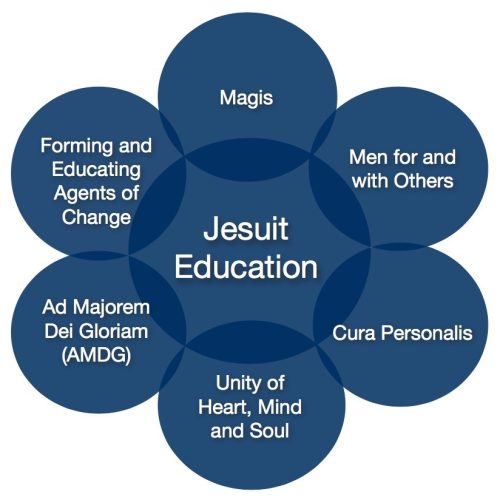A place for holistic growth, equity, liberty and fraternity

Service and justice lie at the heart of Jesuit education. Fr. Pedro Arrupe, S.J., emphasized forming “men and women for others” – people who live not for themselves but for God and others, believing that true love for God must include love and justice for one’s neighbors. Guided by this vision, we educate students to be open to growth, intellectually competent, compassionate, and responsible. Our goal is to nurture individuals who contribute to building an inclusive, just, prosperous, and humane world.
Jesuits are members of the Society of Jesus, founded by Saint Ignatius of Loyola. With over 16,000 members worldwide, we are the largest male religious order in the Catholic Church, serving as pastors, teachers, chaplains, doctors, lawyers, scientists, and more. In all our ministries, we care for the whole person – body, mind, and soul, and strive to nurture “persons for and with others.” Guided by St. Ignatius’ vision to “find God in all things,” we dedicate ourselves to the greater glory of God and the good of humanity. Together with our partners and the extended Jesuit family, we reach out to a diverse world, finding meaning, value, and divine purpose in all things.

We are dedicated to holistic development that supports intellectual, emotional, and ethical growth. We pursue excellence in academics, research, and service learning through innovation and continuous improvement. Integrity and hard work guide our actions and responsibilities. We uphold equity, honesty, and fairness to ensure equal opportunities for all.
A Xavirite is a “person for and with others”. As students and collaborators of the school, it is appropriate that we have the information about the school, the management, its charism and its vision and mission.
We are companions of Jesus responding to His call to foster a humane, inclusive society based on reconciliation and justice, and to care for Mother Earth.
In a spirit of discernment, collaboration and networking we, the Jesuits of Gujarat, commit ourselves
1. To make constant efforts in the spirit of Magis to promote and deepen our Jesuit identity.
2. To protect children and vulnerable adults against abuse.
3. To accompany and inspire youth, and to promote vocations.
4. To equip ourselves in the rapidly changing contexts and accompany the excluded (Dalits, Adivasis, women, children, minorities, etc.) in responding creatively to challenges such as migration, displacement and marginalization.
5. To share the Good News of Jesus Christ while keeping open to enriched by other cultures and traditions.
6. To promote the values enshrined in the Preamble of the Constitution of India.
7. To promote collective responsibility in caring for, nurturing and sustaining Mother Earth, and in safeguarding the rights of the marginalized who are the most affected by its over-exploitation and by environment degradation.

St. Ignatius of Loyola, founder of the Society of Jesus whose members are called Jesuits, led a life marked by transformation, education, and unwavering faith. Born the youngest of eleven in the Basque country, he initially dreamed of knighthood, but a severe injury at the Battle of Pamplona in 1521 became a turning point. During recovery, reading about Jesus and the saints inspired him to serve God with the same zeal he had reserved for the battlefield. He pledged loyalty to the Mother of God at Montserrat, spent a year in prayer and penance at Manresa, and developed the Spiritual Exercises, a guide for seekers of all generations. At 30, he pursued education, learning Latin and earning a master’s from the University of Paris, where he gathered devoted companions who took vows of poverty, chastity, and obedience. In 1540, the Society of Jesus was officially recognized by the Pope, with Ignatius as its first General, dedicated to educating youth. Despite chronic health issues, he remained committed to his mission until his death on July 31, 1556.


